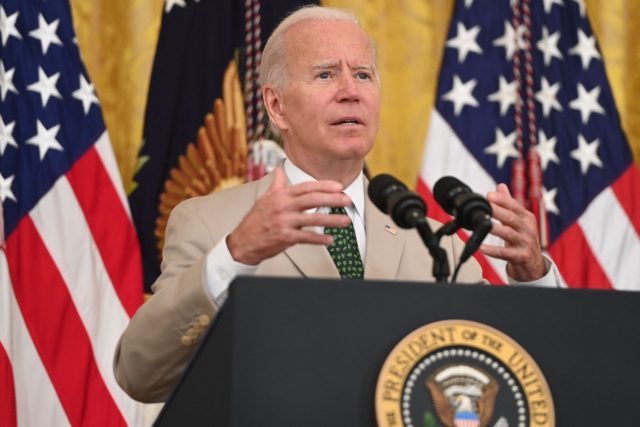A new analysis by the Cook Political Report showed that President Joe Biden’s approval ratings have been dropping according to multiple polls out this week, due to his handling of Coronavirus and the economy and inflation.
According to the analysis published Friday, Biden’s job approval rating has dropped between three and ten points since April. A Marist poll showed a ten point drop since April, while a Monmouth poll showed a nine point drop since then. Two other polls, from CNBC and Quinnipiac showed smaller drops.
The Quinnipiac and CNBC polls showed double-digit number drops on his handling of the Coronavirus — a 22 point and 19 point drop respectively. But the CNBC poll also showed that over the last three months, 14 percent more Americans say they are pessimistic about the current state of the economy — from 37 percent to a majority 51 percent. The poll showed the last time this many Americans were pessimistic about the economy was 2015. The CNBC and Quinnipiac polls showed double-digit drops in Biden’s handling of the economy — ten and 13 points respectively.
According to the analysis, the drop in ratings are largely driven by Democrats, but also independents. Author Amy Walter wrote:
Hart Research’s Jay Campbell, one of the pollsters on the CNBC survey, told me that the biggest dip in economic optimism between April and July came from Democrats. Once the threat of the variant is gone, these voters (who are more supportive of Biden in general) are more likely to feel better about the direction of the economy.
But, independent voters are also becoming more pessimistic about the economy and Biden’s handling of it. In April, 47 percent of independents in the CNBC survey said they thought the economy would get better, just 28 percent thought it would get worse. But, in July, that optimism had faded, with just 35 percent feeling confident things were getting better and 40 percent predicting things would get worse. In the Quinnipiac poll, Biden’s economic job approval ratings among independent voters dropped four points between May and July. These voters — who are less invested in partisanship and more sensitive to real-life changes and struggles — are going to be more challenging for Biden to win back.
Walter wrote that inflation worries and “complaints about a worker shortage due to generous government support” are “coming up a lot” in Republican and Democrat strategists’ focus groups. A June University of Michigan report showed “[s]pontaneous references to high prices for homes, vehicles, and household durables rose to its worst level since the all-time record in November 1974,” and the Monmouth poll showed “everyday bills, food and groceries,” as among their greatest worries.
“In other words, people are feeling the pinch in their pocketbooks. It’s not theoretical,” she wrote.
Growing economic fears could portend trouble for Democrats who want to pass a $3.5 trillion social services spending bill.
“In times of uncertainty, many voters become more risk averse and less willing to support ‘big and bold’ programs. Democratic attempts to add non-economic related priorities — like a codification of DACA – will also make it easier for Republicans to label this as a partisan wish-list instead of an economic life jacket,” Walter wrote.
Read the full analysis here.
Follow Breitbart News’s Kristina Wong on Twitter or on Facebook.

COMMENTS
Please let us know if you're having issues with commenting.